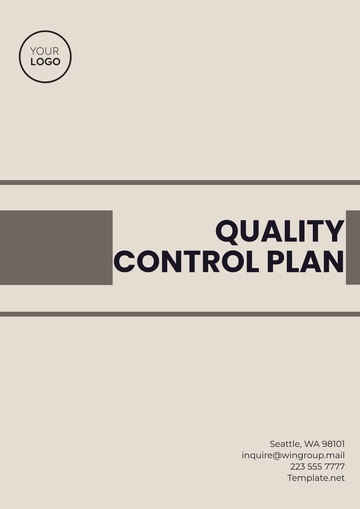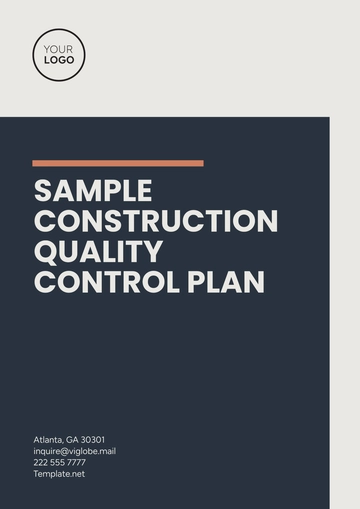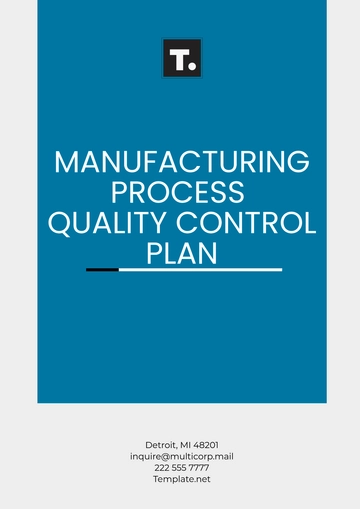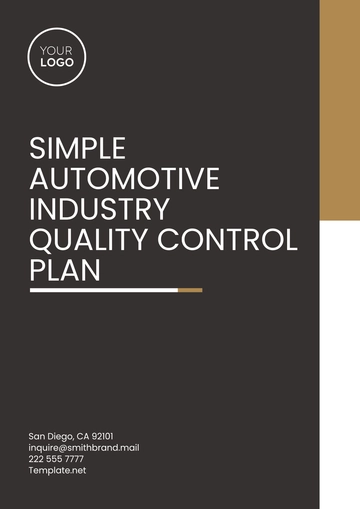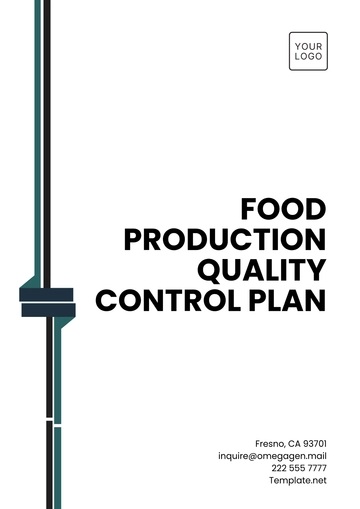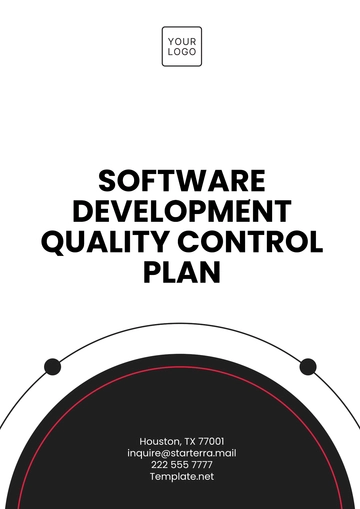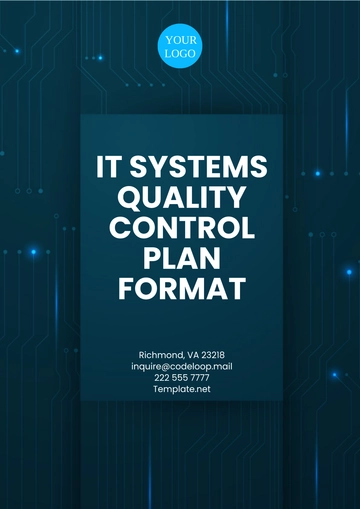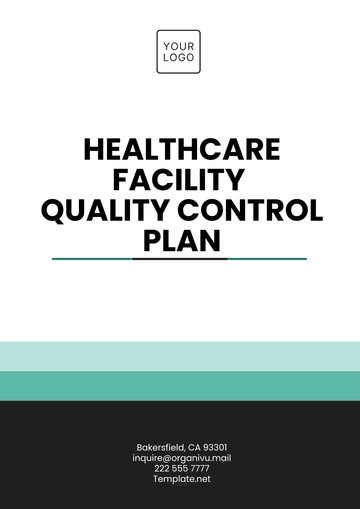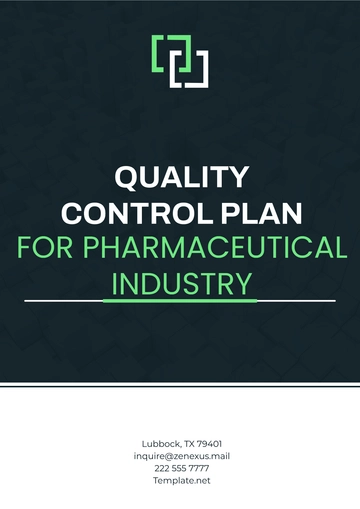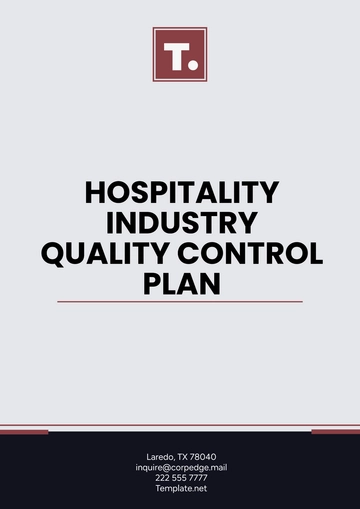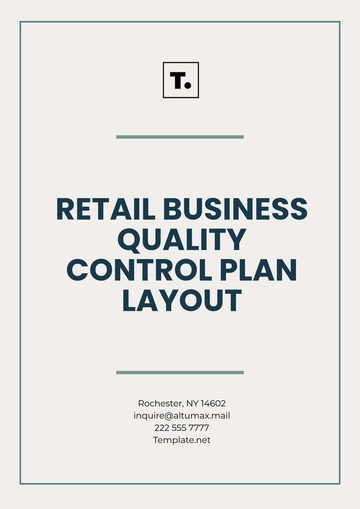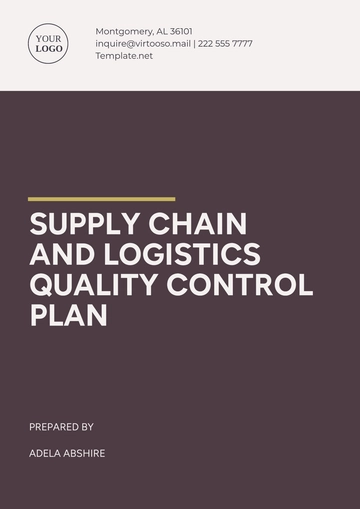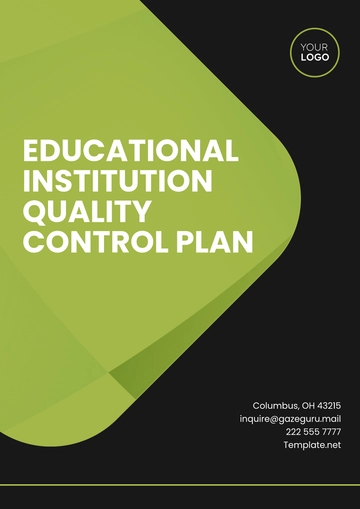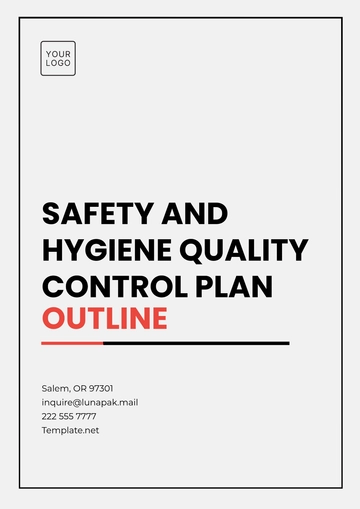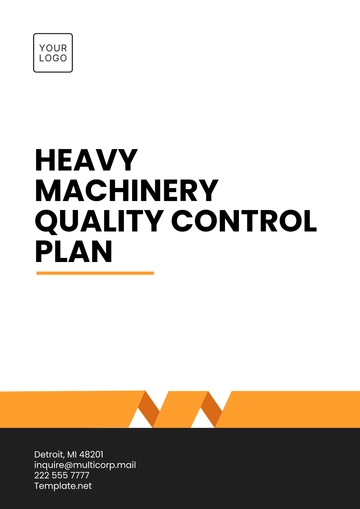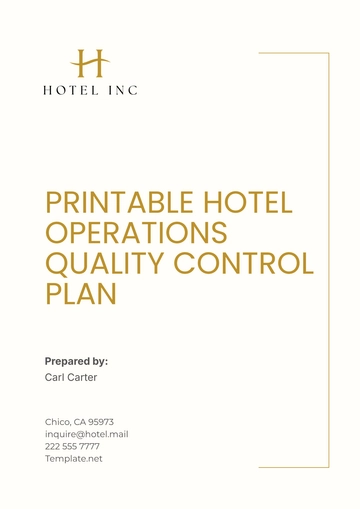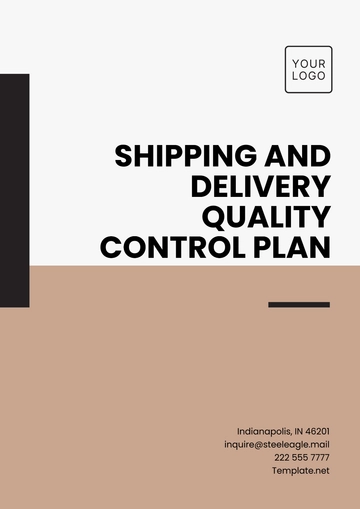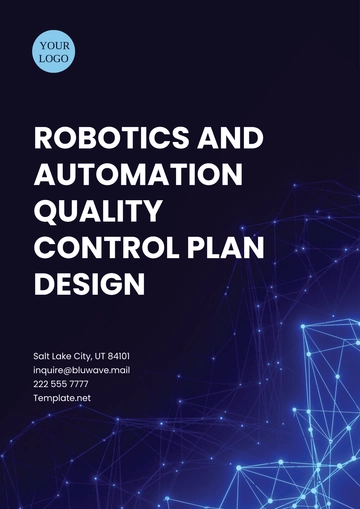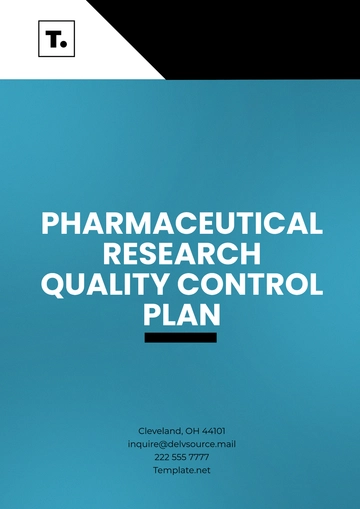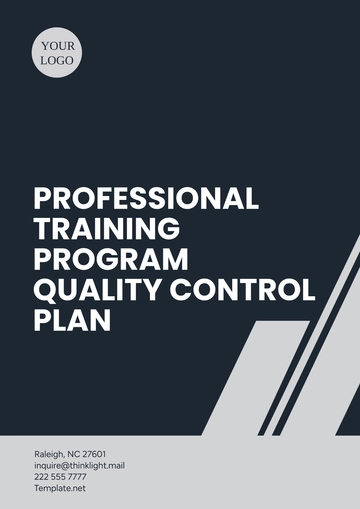Free Pharmaceutical Research Quality Control Plan
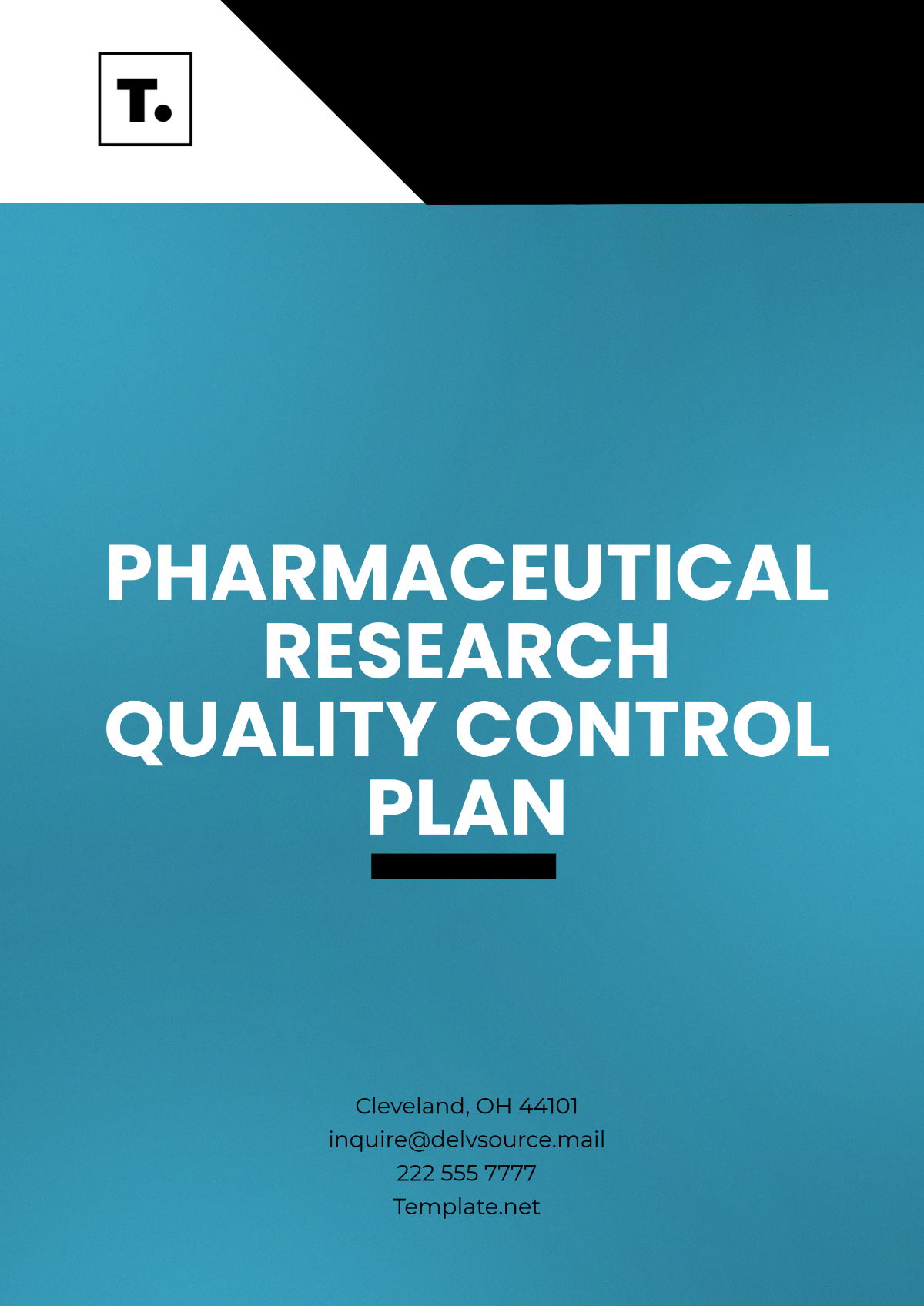
Prepared by:
[Your Name]
[Your Company Name]
1. Introduction
[Your Company Name] is committed to maintaining the highest standards of quality and compliance in all its pharmaceutical research activities. This Pharmaceutical Research Quality Control Plan is designed to ensure that all research processes are conducted in strict accordance with regulatory standards and industry best practices. This document outlines the procedures and protocols that must be followed to uphold the integrity, consistency, and safety of our pharmaceutical research efforts.
2. Quality Control Overview
2.1 Purpose and Scope
The purpose of this quality control plan is to identify and mitigate risks, ensure compliance with regulations, and enhance the reliability of our research. This plan applies to all stages of pharmaceutical research, including formulation design, preclinical studies, clinical trials, and laboratory analysis.
2.2 Regulatory Compliance
This plan is developed in compliance with relevant guidelines including Good Laboratory Practice (GLP), Good Clinical Practice (GCP), and Good Manufacturing Practice (GMP) standards as defined by the FDA, EMA, and other regulatory bodies.
3. Quality Control Procedures
3.1 Raw Material Analysis
All raw materials used in research must undergo rigorous testing to ensure quality and purity. The following table outlines the key parameters to be tested:
Parameter | Testing Method | Acceptable Range |
|---|---|---|
Purity | HPLC | >99% |
Moisture Content | Karl Fischer Titration | <5% |
pH Level | pH Meter | 6.0 - 7.5 |
3.2 Process Monitoring and Control
Ongoing monitoring and control of research processes are essential to promptly identify deviations. Regular audits and inspections should be conducted according to the following schedule:
Weekly inspections of research facilities
Monthly review of laboratory documentation
Quarterly audit of clinical trial protocols
3.3 Data Integrity Verification
Ensuring data integrity is crucial for valid and reliable research outcomes. The following measures will be implemented:
Use of validated electronic data capture systems
Regular data backup and archival
Access controls to ensure data security
4. Training and Competency
4.1 Staff Training
All personnel involved in the research process must receive comprehensive training on quality protocols and procedures. Training sessions will cover:
Quality standards and regulatory guidelines
Laboratory equipment handling
Data management and reporting
4.2 Competency Assessment
Regular assessments will be conducted to ensure staff competency. These assessments will include:
Periodic proficiency testing
Performance evaluations
Certification renewals
5. Documentation and Record Keeping
5.1 Documentation Standards
Accurate and thorough documentation is critical for maintaining the integrity of research processes. All research activities and results must be documented in compliance with regulatory requirements.
Standard Operating Procedures (SOPs)
Laboratory Notebooks
Clinical Trial Records
5.2 Record Retention
All records must be retained for a specified period as required by regulatory bodies. Proper archiving procedures must be followed to ensure records are easily accessible and protected from loss or damage.
Retention period based on regulatory guidelines
Secure and organized storage of records
6. Risk Management
6.1 Risk Assessment
Regular risk assessments must be conducted to identify potential hazards and implement control measures. This includes:
Identifying potential risks
Evaluating the likelihood and impact of risks
Implementing mitigation strategies
6.2 Continuous Improvement
A continuous improvement approach should be adopted to enhance the quality control processes. This includes:
Regular review and update of quality control protocols
Feedback mechanisms to identify areas for improvement
Implementation of corrective and preventive actions
7. Vendor and Supplier Management
7.1 Supplier Qualification
All suppliers of raw materials and services must be qualified through a rigorous evaluation process to ensure they meet our quality standards.
Supplier audits and assessments
Evaluation of supplier quality systems
Ongoing supplier performance monitoring
7.2 Vendor Management
Effective vendor management is essential to maintain the quality and consistency of materials and services. This includes:
Establishing clear quality agreements with vendors
Regular performance reviews and audits
Implementing corrective actions for any identified issues
8. Conclusion
This Quality Control Plan serves as a foundational document to guide [Your Company Name]'s pharmaceutical research toward achieving the highest standards of excellence and compliance. Through diligent implementation of the outlined protocols, the risk of variability or non-compliance can be significantly reduced, thus facilitating successful and credible research outcomes.
- 100% Customizable, free editor
- Access 1 Million+ Templates, photo’s & graphics
- Download or share as a template
- Click and replace photos, graphics, text, backgrounds
- Resize, crop, AI write & more
- Access advanced editor
The Pharmaceutical Research Quality Control Plan Template from Template.net is fully editable and customizable to suit the specific needs of your research processes. Easily adjust the plan to ensure compliance with industry standards. Editable in our AI Editor Tool, this template offers a professional, flexible solution for maintaining high-quality control in pharmaceutical research.
You may also like
- Finance Plan
- Construction Plan
- Sales Plan
- Development Plan
- Career Plan
- Budget Plan
- HR Plan
- Education Plan
- Transition Plan
- Work Plan
- Training Plan
- Communication Plan
- Operation Plan
- Health And Safety Plan
- Strategy Plan
- Professional Development Plan
- Advertising Plan
- Risk Management Plan
- Restaurant Plan
- School Plan
- Nursing Home Patient Care Plan
- Nursing Care Plan
- Plan Event
- Startup Plan
- Social Media Plan
- Staffing Plan
- Annual Plan
- Content Plan
- Payment Plan
- Implementation Plan
- Hotel Plan
- Workout Plan
- Accounting Plan
- Campaign Plan
- Essay Plan
- 30 60 90 Day Plan
- Research Plan
- Recruitment Plan
- 90 Day Plan
- Quarterly Plan
- Emergency Plan
- 5 Year Plan
- Gym Plan
- Personal Plan
- IT and Software Plan
- Treatment Plan
- Real Estate Plan
- Law Firm Plan
- Healthcare Plan
- Improvement Plan
- Media Plan
- 5 Year Business Plan
- Learning Plan
- Marketing Campaign Plan
- Travel Agency Plan
- Cleaning Services Plan
- Interior Design Plan
- Performance Plan
- PR Plan
- Birth Plan
- Life Plan
- SEO Plan
- Disaster Recovery Plan
- Continuity Plan
- Launch Plan
- Legal Plan
- Behavior Plan
- Performance Improvement Plan
- Salon Plan
- Security Plan
- Security Management Plan
- Employee Development Plan
- Quality Plan
- Service Improvement Plan
- Growth Plan
- Incident Response Plan
- Basketball Plan
- Emergency Action Plan
- Product Launch Plan
- Spa Plan
- Employee Training Plan
- Data Analysis Plan
- Employee Action Plan
- Territory Plan
- Audit Plan
- Classroom Plan
- Activity Plan
- Parenting Plan
- Care Plan
- Project Execution Plan
- Exercise Plan
- Internship Plan
- Software Development Plan
- Continuous Improvement Plan
- Leave Plan
- 90 Day Sales Plan
- Advertising Agency Plan
- Employee Transition Plan
- Smart Action Plan
- Workplace Safety Plan
- Behavior Change Plan
- Contingency Plan
- Continuity of Operations Plan
- Health Plan
- Quality Control Plan
- Self Plan
- Sports Development Plan
- Change Management Plan
- Ecommerce Plan
- Personal Financial Plan
- Process Improvement Plan
- 30-60-90 Day Sales Plan
- Crisis Management Plan
- Engagement Plan
- Execution Plan
- Pandemic Plan
- Quality Assurance Plan
- Service Continuity Plan
- Agile Project Plan
- Fundraising Plan
- Job Transition Plan
- Asset Maintenance Plan
- Maintenance Plan
- Software Test Plan
- Staff Training and Development Plan
- 3 Year Plan
- Brand Activation Plan
- Release Plan
- Resource Plan
- Risk Mitigation Plan
- Teacher Plan
- 30 60 90 Day Plan for New Manager
- Food Safety Plan
- Food Truck Plan
- Hiring Plan
- Quality Management Plan
- Wellness Plan
- Behavior Intervention Plan
- Bonus Plan
- Investment Plan
- Maternity Leave Plan
- Pandemic Response Plan
- Succession Planning
- Coaching Plan
- Configuration Management Plan
- Remote Work Plan
- Self Care Plan
- Teaching Plan
- 100-Day Plan
- HACCP Plan
- Student Plan
- Sustainability Plan
- 30 60 90 Day Plan for Interview
- Access Plan
- Site Specific Safety Plan
